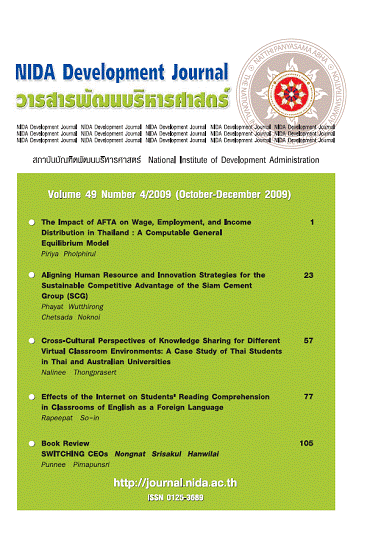Cross-Cultural Perspectives of Knowledge Sharing for Different Virtual Classroom Environments: A Case Study of Thai Students in Thai and Australian Universities
Keywords:
Cross Culture, knowledge sharing, Virtual classroom, Knowledge managementAbstract
Collaborative learning has been accepted as an effective learning style that can enhance students’ and instructors’ ability to create knowledge and develop understanding. The sharing of knowledge and experience through collaborative learning can be enhanced by use of information communication technologies (ICT). There are a number of ways in which culture influences the use of these information technologies. Among the cultural characteristics, which can be viewed as the factors that influence knowledge sharing in a virtual classroom, are power distance, uncertainty avoidance, and individualism/collectivism.
The main purpose of this study was to investigate how differences in cultural values affect the way Thai students in both Thailand and Australia access and share knowledge in a virtual classroom. According to Hofstede (2001), the culture of Thais and Australians is different in the degree of power distance, uncertainty avoidance, and individualism/collectivism. Thais are likely, for example, to exhibit high power distance, high uncertainty avoidance, and collectivism while Australians exhibit low power distance, low uncertainty avoidance, and individualism.
A quantitative method using t-test and Multiple Regression analysis was chosen to test the research hypotheses that Thai students in Thai universities have greater difficulty in knowledge sharing than Thai students in Australian universities. A questionnaire survey designed to identify cultural differences was administrated to 100 students in Thai universities and 100 students in Australian universities who used ICT for sharing knowledge in their virtual classroom. The research found that power distance and uncertainty avoidance were two cultural aspects that significantly inhibited knowledge sharing in these universities. On the other hand, collectivist culture could promote Thai students’ knowledge sharing both in Thai and Australian universities. The research outcome of the study can assist project managers and teachers in implementing effective open-wide knowledge exchange systems by taking into account cultural differences. This can enhance the learning process as well as provide effective assessment tasks.
การใช้เทคโนโลยี่สารสนเทศสนับสนุนการเรียนรู้ในรูปแบบของความร่วมมือระหว่างผู้เรียนด้วยกันและกับผู้สอนในห้องเรียนเสมือนได้รับการยอมรับว่าเป็นวิธีการเรียนที่มีประสิทธิภาพที่ส่งเสริมให้ผู้เรียนสามารถแลกเปลี่ยนเรียนรู้ ตลอดจนสร้างองค์ความรู้ใหม่ ๆ การแลกเปลี่ยนเรียนรู้ในห้องเรียนเสมือนจะมีประสิทธิภาพหรือไม่ขึ้นอยู่กับปัจจัยหลายประการ ปัจจัยหนึ่งที่ได้รับการยอมรับว่ามีอิทธิพลต่อการเรียนการสอนรูปแบบนี้ ได้แก่ปัจจัยทางวัฒนธรรมได้แก่ความเหลื่อมล้ำของอำนาจ การหลีกเลี่ยงความไม่แน่นอน และความเป็นปัจเจกนิยม/กลุ่มนิยม
ความแตกต่างทางวัฒนธรรมของสังคมไทยและสังคมออสเตรเลียจึงเป็นประเด็นในการศึกษา โดยอ้างอิงถึงผลการศึกษาของ Hofstede ที่ว่าระดับของความเหลื่อมล้ำของอำนาจ การหลีกเลี่ยงความไม่แน่นอน และความเป็นกลุ่มนิยม ของสังคมไทยมีมากกว่าสังคมออสเตรเลีย การวิจัยเชิงปริมาณโดยการทดสอบความแตกต่างระหว่างค่าเฉลี่ยสองกลุ่ม และการวิเคราะห์ความถดถอยเชิงพหุ เพื่อทดสอบ สมมติฐานการวิจัยที่ว่า ปัจจัยทางวัฒนธรรมเหล่านี้มีอิทธิพลและเป็นอุปสรรคต่อการแลกเปลี่ยนเรียนรู้ของนักเรียนไทยที่ศึกษาในมหาวิทยาลัยไทย มากกว่านักเรียนไทยที่ศึกษาในมหาวิทยาลัยออสเตรเลีย โดยใช้แบบสอบถามกับกลุ่มตัวอย่างประเทศละ 100 คน ผลการวิจัยพบว่า ความเหลื่อมล้ำของอำนาจ การหลีกเลี่ยงความไม่แน่นอน เป็นอุปสรรคต่อการแลกเปลี่ยนเรียนรู้ในห้องเรียนเสมือนของนักเรียนไทยทั้งสองกลุ่ม ขณะที่ความเป็นกลุ่มนิยม เป็นวัฒนธรรมที่ส่งเสริมประสิทธิภาพการแลกเปลี่ยนเรียนรู้ของนักเรียนไทยทั้งในมหาวิทยาลัยไทย และออสเตรเลีย ซึ่งผลของการศึกษาดังกล่าวสามารถนำมาพัฒนากระบวนการเรียนการสอนแบบห้องเรียนเสมือนให้เหมาะสมกับสภาพแวดล้อมในแต่ละประเทศให้มีประสิทธิภาพยิ่งขึ้น





